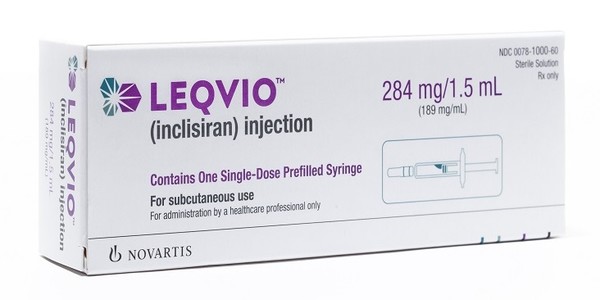Novartis has faced a hurdle with rolling out inclisiran (brand name: Leqvio), a cholesterol-lowering medication, in Europe.
British medical groups have raised concerns about the agreement between Novartis and the British government to distribute the drug at a discounted price.

The British Medical Association (BMA) and the Royal College of General Practitioners (RCGP) demanded the U.K. government reconsider the market release of inclisiran in primary care.
In September, Novartis and the National Health Service agreed to make inclisiran more accessible at a radically lowered price for the first time in the world.
Under the deal, Novartis had planned to provide inclisiran for about 300,000 people at primary care across the U.K. at a discounted price to prevent secondary cardiovascular diseases.
However, BMA and RCGP emphasized that inclisiran was a “black triangle drug,” or a drug with a new mechanism or a new form and that there were still questions to be answered regarding the release of the drug.
BMA and RCGP said inclisiran lacked long-term data on cardiovascular outcomes, and relevant studies are not available until 2026.
“It lacks long-term safety data and as yet potential unknown long-term side effects and interactions of the medication,” they said in a statement.
They also questioned whether primary care has any capacity to use additional resources to deliver this new drug at a time of unprecedented demand and shortages in the healthcare workforce amid Covid-19.
While finding the answers to these questions, BMA and RCGP said they would encourage doctors to continue to treat patients with high cholesterol following lipid guidelines focusing on all options, including lifestyle changes, statins, high-intensity statins, and ezetimibe, and injections where appropriate.
If primary care clinicians initiate inclisiran, they should be aware that they will take full responsibility for the prescription as the decision-maker, they added.
If doctors decide to prescribe inclisiran, they should share the knowledge with the patient about the lack of long-term data and unknown long-term safety profile of the new drug and get informed consent, BMA and RCGP said.
Doctors should also encourage patients to report all side effects, however minor, and should fill in an MHRA (Medicines and Healthcare products Regulatory Agency) report on side effects, any potential drug interactions, or concerns of their own as soon as possible.
“This approach will enable any as yet unknown issues to be identified early and help inform how the medication can be used in the future, alongside the trial data that are expected to publish in 2026,” BMA and RCGP said.
Inclisiran is the first small interfering RNA (siRNA) agent that lowers the LDL-cholesterol (LDL-C) by blocking proprotein convertase subtilisin/kexin type 9 (PCSK9) in the liver.
In phase 3 ORION trials (ORION-9, 10, 11), inclisiran showed a 50 percent LDL-C reduction.
The effect was non-inferior to Amgen’s anti-PCSK9 monoclonal antibody Repatha (evolocumab) and Sanofi’s Praluent (alirocumab).
While existing anti-PCSK9 monoclonal antibodies need 26 times of injections annually, inclisiran can be administered only twice per year to cause the same effect.
Novartis won the marketing approval for inclisiran in Europe in late 2020 and hopes to get FDA approval in January 2022.
In Korea, Novartis plans to complete the authorized clinical trial in June 2022 and prepare for a global release of the drug.

